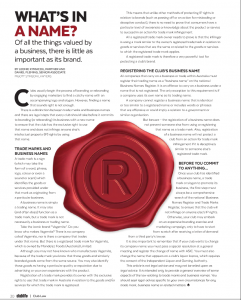The following article appeared in the July 2015 issue of Club Life.
Clubs usually begin the process of branding or rebranding by engaging marketers to find a catchy name with an accompanying logo and slogan. However, finding a name that sounds right is not enough.
There is a distinction between trade marks and business names and there are legal steps that every club should take before it commits to branding (or rebranding) its business with a new name to ensure that the club has the exclusive right to use that name and does not infringe anyone else’s intellectual property (IP) rights by using that name.
Trade marks and business names
A trade mark is a sign (which may take the form of a word, phrase, logo, colour or even a sound or scent) which identifies the goods or services provided under that mark as originating from a particular business.
A business name is simply a trading name. It may also (and often does) function as a trade mark, but a trade mark is not necessarily a business or trading name.
Take the iconic brand “Vegemite”. Do you know who makes Vegemite? There is no company called Vegemite, nor is there a company that trades under that name. But there is a registered trade mark for Vegemite, which is owned by Mondelez Foods (Australia) Limited.
Although you may not have known who manufactures Vegemite, because of the trade mark you know that those goods and similarly branded goods come from the same source. You may also identify those goods as having a particular quality or reputation due to advertising or your own experiences with the product.
Registration of a trade mark provides its owner with the exclusive rights to use that trade mark in Australia in relation to the goods and/or services for which the trade mark is registered.
This means that unlike other methods of protecting IP rights in relation to brands (such as passing off or an action for misleading or deceptive conduct), there is no need to prove that consumers have a particular level of awareness or knowledge about the product or service to succeed in an action for trade mark infringement.
All a registered trade mark owner needs to prove is that the infringer is using a mark similar to the owner’s registered trade mark in relation to goods or services that are the same or related to the goods or services to which the registered trade mark applies.
A registered trade mark is therefore a very powerful tool for protecting a club’s brand.
Registering the club’s business name
All companies that carry on a business or trade within Australia must register their trading name as a “business name” on the national Business Names Register. It is an offence to carry on a business under a name that is not registered. The only exception to this requirement is if a company uses its own name as its trading name.
A company cannot register a business name that is identical or too similar to a registered name or includes words or phrases that are offensive or could imply a relation to a government or similar organisation. But beware – the registration of a business name does not prevent someone else from using or registering that name as a trade mark. Also, registration of a business name will not protect a club from an action for trade mark infringement if it is deceptively similar to someone else’s registered trade mark.
Before you commit to anything…
Once your club has identified a business name, a trade mark or a slogan to promote its business, the first step must always be a comprehensive search of the national Business Names Register and Trade Marks Register, to ensure that the club will not infringe on anyone else’s IP rights.
Otherwise, your club may embark on an expensive branding exercise and marketing campaign, only to have to start from scratch after receiving a letter of demand from a third party’s lawyer.
It is also important to remember that if your club wants to change its company name you must pass a special resolution at a general meeting and register the change of name with ASIC. You must also change the name that appears on a club’s liquor licence, which requires the consent of the Independent Liquor and Gaming Authority.
For further information contact Daniel Fleming on d.fleming@pigott.com.au or Leonie Kyriacou on l.kyriacou@pigott.com.au.
Click on the image below to see the article as it appeared in Club Life July 2015.
This article is not legal advice and may not be relied upon as legal advice. It is intended only to provide a general overview of some aspects of the law relating to trade marks and business names. You should seek legal advice specific to your own circumstances for any trade mark, business name or related matters.
Prepared by Leonie Kyriacou and Daniel Fleming


